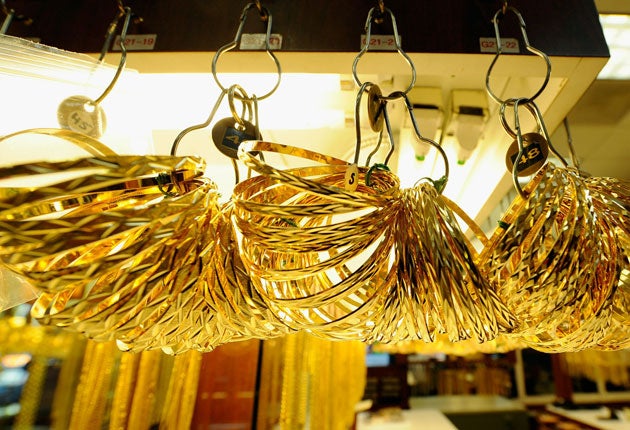Small Talk: Going for gold in Western Australia with GGG Resources

Gold continues to glitter. Prices are up strongly and, despite coming back a bit in last the month or two, still remain close to the $1,400 (£887) per ounce mark.
Recent news from the US, where the Federal Reserve unveiled plans to pump yet more money into the economy, has proved supportive, as has an update on China's appetite for the yellow metal.
In a rare disclosure, the head of the Shanghai Gold Exchange revealed that the country had imported more than 209 tons of the safe-haven metal in the first 10 months of the year. The surge was pinned on investor demand for a hedge against the prospect of inflation as the US and others stick with loose monetary policies.
And yet GGG Resources, the Western Australia-focused gold miner, continues to be overlooked by the market – though you would not know it by looking at the share price. Indeed, the stock is up more than 170 per cent since the beginning of July.
But that is only part of the story. Rising gold prices have pushed up valuations almost across the board, with similar gold companies being valued at an average of $87.5 per resource ounce from around $67 per resource ounce, according to Westhouse. And though GGG's valuation has also risen, it remains well below the average – in fact, at under $30 per resource ounce, Westhouse puts it at the bottom of the table of comparable companies.
GGG is developing the fully permitted Bullabulling gold mine with its 50/50 joint venture partner Auzex Resources. In terms of the amount of gold, the mine boasts an inferred resource of around two million ounces. The recently commenced drill programme is aimed at improving both the quality and quantity of the current resource, with the updated estimates expected early next year, though investors could begin to get results before the end of 2010.
Following that, investors can look forward to the completion of the feasibility study, which is scheduled for the final quarter of 2011. Mine construction is next, with the company targeting 2012, and then production, which is slated for the beginning of the year after.
On the management front, GGG is led by chairman Peter Ruxton, who, besides experience as a fund manager, brings first-hand knowledge of the mining industry in Western Australia. Investors might recognise the name from AIM-listed Platmin, which counts him as a non-executive director.
Hummingbird set to list on AIM
Sticking with gold, Hummingbird Resources, the Liberia-focused gold prospector, plans to make its AIM debut this Friday.
The group boasts rights to the largest mineral exploration area in eastern Liberia, with 14 exploration licenses spanning all minerals save iron ore. In total, its rights extend across 7,000 square kilometres in the east and a further 155 square kilometres in the north of country, close to BHP Billiton's Mount Kitoma iron ore project and the steel giant Arcelor-Mittal's Yekepa project, which contains the Mount Nimba iron ore mine.
Hummingbird is looking to raise $40m from the flotation, with the proceeds earmarked for exploration activities such as mapping, drilling and soil sampling, and for capital expenditure to support those activities, including spending on access roads, camps and equipment.
As a final point, it is worth taking note of the management team, which is chaired by one Ian Cockerill, the former chief executive of Gold Fields, the world's fourth largest gold business.
The chief executive is Daniel Betts, who has worked with various commodities businesses in Uganda, Namibia, Sierra Leone and Mauritania. "The funds raised will help the company further develop through the systematic exploration of its license areas," Mr Betts said. "We aim to improve our understanding of the targets we have already identified and to discover further significant gold resources in the region."
London continues to lure start-ups
From Australia to Africa to England, where the recession has hit almost every corner of the economy. Although London, with its concentration of financial services companies, took a battering, it still remains the destination of choice for start-ups, according to a new report based on Companies House data.
The capital leads the way, seeing a 91 per cent increase in start-ups since 2008. Beyond London, the report from the website Yoodoo.biz shows Manchester in second place, with an 80 per cent rise in new businesses over the last two years, and Liverpool ranked third with an increase of 77 cent per cent. The figures for 2010 tell a similar story, with London leading the way with nearly 60,000 new businesses opening doors this year.
The regional picture is less encouraging, with the East Midlands, for example, seeing the number of new business start-ups fall at an annual rate of more than 15 per cent in 2010. Yorkshire, the Humber and the North East have also seen declines.
"The recession has actually provided an opportunity for people to re-evaluate their career ambitions and tackle unemployment and redundancy through starting their own business," Yoodoo.biz chief executive, Tony Heywood, said.
Given the uncertain economic backdrop, and the apparent disparity between the cities and the regions, however, he was careful to maintain a note of caution. "Whilst we're clearly off to a good start [in] encouraging new businesses to help move the economy forward, existing support structures clearly aren't hitting the mark in the regions," he said.
Subscribe to Independent Premium to bookmark this article
Want to bookmark your favourite articles and stories to read or reference later? Start your Independent Premium subscription today.

Join our commenting forum
Join thought-provoking conversations, follow other Independent readers and see their replies